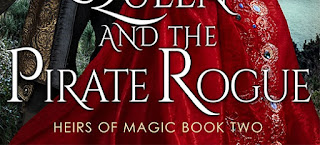You know how polite social discussion should always avoid politics or religion? Well, we're kind of blowing that up on SFF Seven this week. We are talking about the R word. Religion. Specifically, we're talking about religion's place in story and how -- or if -- we use religion to drive story arcs.
And to that I answer, yes. Even if we don't call it religion, every good character has a moral code. One of my favorite examples of that is the character Amos in The Expanse (book series and tv show). He comes right out and says early on that there are three types of people: those you follow, those you protect, and those you kill. And then the rest of the series is how he sorts folks into those pails and what it takes to move someone from one pail to another. He never mentions gods or faith or anything like that, but his sorting system is a religion, and he's so consistent in applying it that it makes for fascinating character interactions and interior growth.
In my cyberpunk romance series that begins with Wanted and Wired, the setting is mid-21st-century, so it's close enough that the characters all have recognizable religious affiliations. Most are secularists, but a few -- notably Kellen, the animal lover and all-around good guy -- have vestigial Christianity clinging to them. This presents as his easy ability to have faith, both in people and in phenomena, and it puts him at odds with his true love Angela, who is evangelically secular and maybe even a little hostile to all religion. I tried to play with that push and pull and come out with a "see, we can all get along without anybody having to lose their individual essence" conclusion. Not sure if I succeeded, but that was definitely in my mind when I was writing.
Religion is a little trickier in the world I'm writing right now, because it's set in the far future when humanity is an interstellar civilization. Their religions, therefore, should be less recognizable, and I don't want to just set up easy analogs for the current major religions and go from there. Instead I've tried to develop religions that would, I think, make sense to these highly technological people. To do that, I've looked at historical rise and fall of religions and discovered that we tend to develop religion as a response to phenomena that we know a little bit about, are impressed by or fear, and hope will not harm us. So my starfaring folk of the future literally worship the stars and the vast, mysterious space between. I think it makes for some fun dynamics with my characters:
Just before fitting the tube to his mouth, Ash caught her gaze and smiled. Not an intimidating smile at all and quite friendly even. Also loaded with memories, all of which hit her at once. How very unfair. Memories should not make one want to weep.
“Stars’ breath to you, Hestia,” he said.
The words were an aphorism based on the fanciful notion that benevolent stars literally breathed travelers across the void on drifts of grace and interstellar radiation. That wasn’t how faster-than-light travel worked. Honestly, no human knew precisely how it worked. Only the vast computer System, which controlled travel and most everything else, really knew. Without the System, people would be unable to travel between planets, no less between stars. But people didn’t like to be reminded of their required subservience to machines, and also the species was as a whole given to poetics, so they made up these stories about stars breathing and such. People being people, she guessed, reached for comfort where they could.
Still. No one had wished her stars’ breath at the outset of a voyage in … well, a long time. She was startled by how un-alone it made her feel, but this time in a good way. Too good, drat him.
“Same to you,” she managed before the lid of her berth hissed shut.








